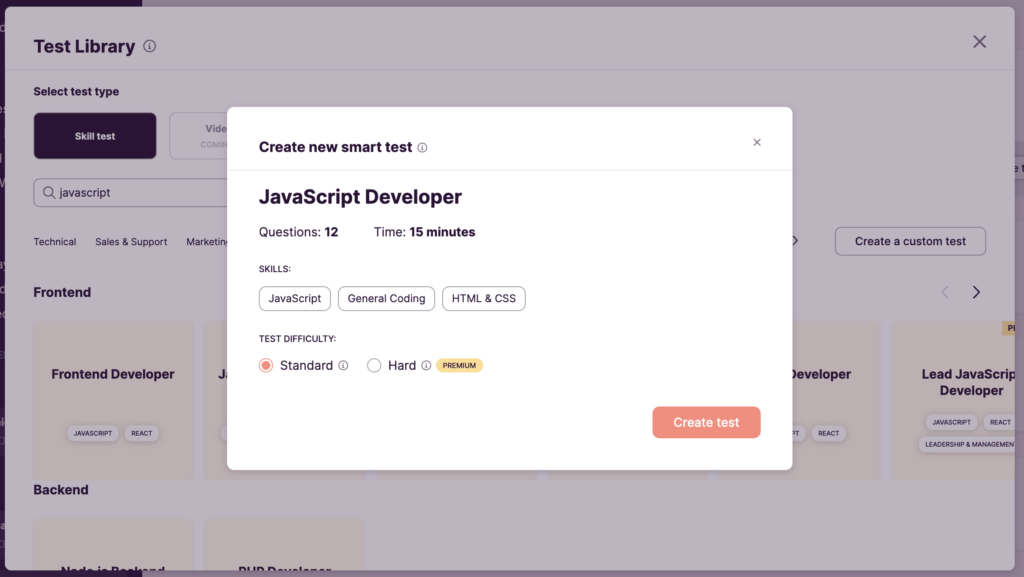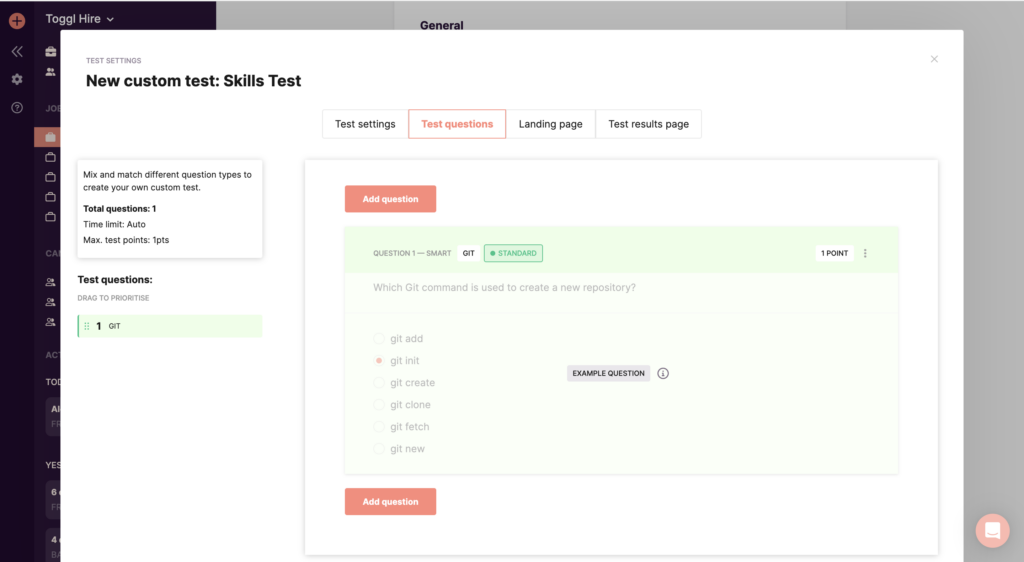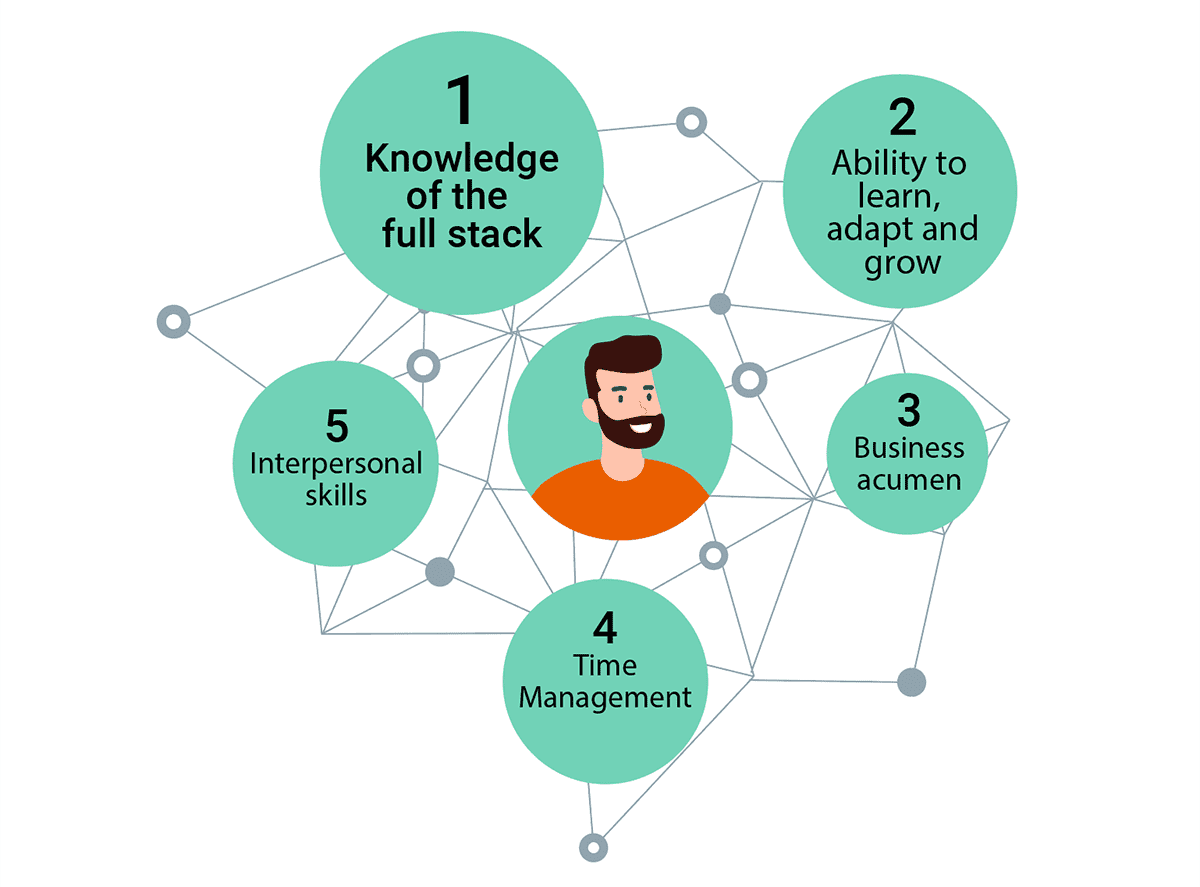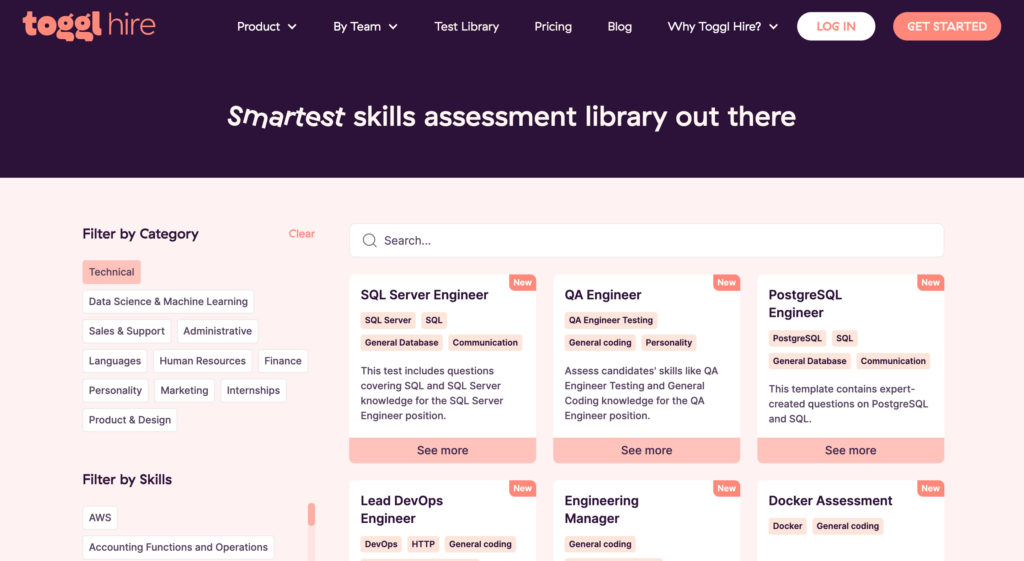Hiring a great programmer is a monumental challenge for many reasons.
Technology is advancing at unprecedented speeds. Coding skills that were relevant two years ago might hold little value today. So the only way to identify excellent candidates for your particular business need is to test their programming skills.
But assessing a candidate’s skills can take many forms – from simple programming tests to live coding challenges and take-home assignments. How do you decide?
More importantly, hiring candidates with programming skills is an investment, as their salaries will often represent a large portion of the payroll. Making the wrong hire can be an expensive mistake.
So how do you go about selecting the best candidates for a development role?
Simple – a fine-tuned recruitment process that leverages the power of proper programming tests.
In this article, we’ll go over:
- The importance of programming tests
- What coding tests reveal about your next developer
- 11 popular programming skills companies want to test
- Why you should use programming tests
How do companies test programming skills before hiring developers?
There are three key ways to test a candidate’s programming skills before bringing them on board. Use them in conjunction with each other to develop the best assessment process.
1. Review a candidate’s entire portfolio
Evaluating a candidate’s portfolio, projects, and GitHub and Stack Overflow activity is a great way to determine the quality of their programming skills.
You should look at their past projects, hobby projects, and examples of code, as well as any blogs or open-source projects they have worked on.
This can help you to weed out candidates and decide who gets to the first round of interviews.
2. Conduct candidate interviews and screening tests
Interviews are a great, and traditional, way to understand if the candidate has good communication skills, understand their problem-solving skills and see how they work together with others on projects.
That said, structured interviews can also help to gain an overview of your candidates’ technical coding skills. Ask them about projects they recently worked on or about the programming languages and frameworks they will need to use.
3. Test programming skills with coding tests
If used in the right way, skill-based tests can be a great way to objectively assess your candidates’ skills.
When deciding which coding test to use, however, it’s important to consider the overall user experience based on the seniority level of the candidate.
Not all programming tests work for every seniority level, so make sure to choose the coding challenges that are appropriate for the position.
What can coding tests reveal about candidates?
Coding tests are a type of assessment that companies can use to evaluate the programming skills of candidates. These tests typically involve asking candidates to solve coding challenges in a set amount of time.
An online coding test is used to assess the candidate’s knowledge of specific coding languages, frameworks, and technologies, as well as compare the candidate’s abilities to others applying for the same position.
Coding tests can reveal a number of things about candidates, including:
Evaluating programming skills
They accurately evaluate a candidate’s coding skills by providing a reliable and objective assessment of their abilities. These online tests can help companies determine a candidate’s proficiency in specific programming languages and technologies – and their ability to write clean and efficient code.
Soft skills
These tests can reveal a candidate’s critical thinking skills, communication abilities, and time management skills.
By assessing these skills, companies can get a better understanding of how a candidate would fit into their team and company culture, and whether they have the necessary qualities to succeed in the role.
General cognitive abilities
Coding tests can not only assess a candidate’s coding skills, but also provide a measure of their general cognitive abilities.
These abilities include problem-solving skills, creativity, and the ability to learn new things. These skills are important for success in software development and can be evaluated through coding tests and other types of assessments.
By assessing these abilities, companies can determine whether a candidate has the potential to thrive in a software development role and adapt to new technologies and challenges.
11 Programming Skills Employers Want to Test
These are some of the top programming skills and languages that hiring managers and companies are on the lookout for:
1. General Coding
Coding is an essential skill in today’s digital world. Knowledge workers use coding skills in a wide range of fields, from software development to data science and machine learning. It is the process of writing instructions for a computer to execute. Even spreadsheet formulas are a type of general coding.
2. JavaScript

JavaScript is a popular programming language that is widely used for developing web applications. It is easy to learn and use, and it is supported by all major web browsers. Developers use JavaScipt for a variety of purposes, such as creating interactive elements on websites, building web servers and back-end systems, and creating mobile and video game applications.
3. React
React is a JavaScript library that is widely used for building user interfaces (UIs) for web applications. Its popularity comes from its ability to make it easier to build complex UIs by breaking them down into smaller, reusable components. Many renowned companies, including Facebook, Netflix, and Airbnb, use the React language.
4. H T M L & CSS
HTML (HyperText Markup Language) and CSS (Cascading Style Sheets) are two widely used technologies for building and styling web pages. HTML is used to define the structure and content of a web page, while CSS is used to define the style and layout. Together, they are essential components of almost every website on the internet.
5. General Database
Databases are an essential component of many systems, providing businesses of all sizes with a means to store and manage their data. There are a variety of different database types, including relational, NoSQL, and in-memory databases, all of which can be used to facilitate efficient data storage, management, and retrieval.
6. SQL
SQL (Structured Query Language) is a widely used language for managing data stored in relational databases. It is popular because it is easy to learn and use, and it is supported by most database management systems. SQL is used by businesses of all sizes to manage data, create reports, and gain insights from their data.
7. Node.js
Node.js is another popular JavaScript runtime environment that is used for building server-side applications. Its popularity comes from its ability to allow developers to write JavaScript code for execution on the server, rather than in the browser. Node.js is often used to build web servers, microservices, and other types of back-end systems.
8. Rest
REST (Representational State Transfer) is an architectural style for building web APIs (Application Programming Interfaces). It is popular because it is simple, flexible, and widely supported. REST is used to build APIs that allow different systems to communicate with each other over the internet.
9. Git

Git is a widely-supported, easy-to-use version control system that provides software development teams with a range of features and capabilities for tracking changes to files, managing their codebase, and collaborating on projects. It is a popular choice for many teams, due to its robust and user-friendly design.
10. TypeScript
Built on top of JavaScript, TypeScript provides optional static typing and a range of other features. By adding extra safety and security to the programming process, TypeScript is frequently used in the development of large, complex JavaScript applications, and is supported by a variety of development tools and frameworks.
11. Python
Thanks to its easy-to-learn syntax and straightforward approach, Python is a popular programming language. With a large and active community of users, there is a wide range of online resources, libraries, and frameworks available to developers. Additionally, Python’s versatility makes it suitable for a variety of tasks, specifically data analysis and artificial intelligence.
What other non-technical skills should employers evaluate in their hiring process?
Non-technical skills, also known as “soft skills,” are important for software developers to have because they help developers work effectively with others, handle challenges and change, and navigate the demands of their job.
Employers should evaluate candidates for these skills during the hiring process because they are essential for a developer to succeed.
Some non-technical skills that employers may want to evaluate in their recruitment process include:
1. Communication skills
Being able to clearly and effectively communicate with team members, clients, and stakeholders is crucial for a software developer.
2. Problem-solving abilities
Developers must be able to identify and troubleshoot issues that arise in a project.
3. Teamwork skills
Developers often work in teams, so being able to work effectively with others is essential to completing the task at hand.
4. Work ethic
Having a strong work ethic and a dedication to producing high-quality work is important for a developer.
5. Time management skills
Developers often have to juggle multiple tasks and deadlines, so good time management skills are important for staying organized and on track.
6. Ability to learn and adapt quickly
The field of software development is constantly evolving, so developers must be able to adapt and learn new technologies and techniques quickly.
7. Leadership skills
Developers may be called upon to take on leadership roles, so having the ability to lead and guide others can be useful.
8. Work ethic
Having a strong work ethic and a dedication to producing high-quality work is important for a software developer. This includes being self-motivated, reliable, and willing to put in extra effort when necessary.
9. Being open to criticism
Receiving and responding to feedback is an important part of any job, and software development is no exception. Being open to criticism and being able to use it constructively to improve your work is a valuable skill for a developer to have.
Ultimately, the specific non-technical skills that are important will depend on the specific needs of the employer and the role that the software developer will be filling.

Should you implement programming tests?
At Toggl, we’re biased because we love skills tests! However, it is important to test programming skills when evaluating candidates for a software development role. One way to do this is by using a tool like Skills Tests, which allows users to autogenerate programming tests and review sample questions.
It’s quick and easy to create a programming test in Toggl Hire. Simply:
- Select the programming language that the coding test will be based on.
- Choose the difficulty level of the test.
- Select the time limit for the test.
- Customize the test by adding or removing questions as needed.
Once the test is created, it is a good idea to share it internally with subject matter experts and have them complete the test to provide a benchmark score. This can help users get a sense of what a strong score looks like and identify areas for improvement.
All of our tests go through a rigorous review process to ensure their quality and fairness. This helps to ensure that users can trust the results of the tests and use them to make informed hiring decisions.

Upgrade your hiring process by adding a programming test or a coding challenge in no time with pre-built assessment templates!
Juste loves investigating through writing. A copywriter by trade, she spent the last ten years in startups, telling stories and building marketing teams. She works at Toggl Hire and writes about how businesses can recruit really great people.







